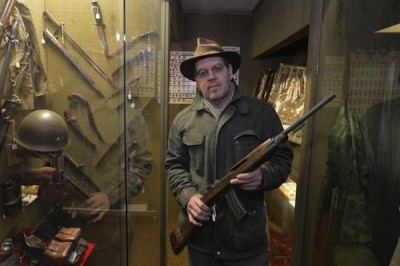
“Lynden Museum Director Troy Luginbill holds a Korean War-era M1 carbine Tuesday, Nov. 18, 2014, on loan to the museum.” (Photo: Philip A. Dwyer, The Bellingham Herald)
Earlier this month, Washington State passed a universal background check ballot initiative known as I-594. Now, the unintended consequences of the “feel-good” bill are beginning to rear their ugly heads.
Case in point, the Lynden Pioneer Museum has opted to remove several World War II-era firearms from an exhibit and return them to their owners because curators are worried that they may be in violation of the new law.
The exhibit is called “Over the Beach: The WWII Pacific Theater,” and showcases, among other military equipment, an anti-tank rifle, a Johnson M1941 and a Japanese infantry rifle.
Last week Thursday, the museum made the announcement on its Facebook page that it would be returning the historic guns.
“The museum will be returning these guns to their owners because as of Dec. 4, we would be in violation of the law if we had loaned firearms that had not undergone the background check procedure,” read the post.
“Hopefully the state will find a way with initiative 594 to allow museums the option of having guns loaned for display without the heavy financial burden that will go with the transfer process outlined in initiative 594,” the statement continued.
Troy Luginbill, the museum’s director, spoke with The Bellingham Herald about the dilemma.
“We have elected to comply with the law as we understand it,” explained Luginbill. “The ideal situation would be if someone comes along from the state and says, ‘Don’t worry about it.’ If that happens before May 1, we can put the guns back on display.”
I-594 has some exceptions, such as gifts between immediate family members, antiques and relics, temporary transfers for self-defense, and loans for lawful hunting or sporting activities. However, due to the age of the rifles, they don’t qualify as antiques or relics. Typically antique firearms are classified as firearms manufactured prior to 1898.
“I read through the law about 10 different times looking for a loophole,” Luginbill said in an interview.
Meanwhile, State Attorney General Bob Ferguson said no state official or county prosecutor has challenged the law or requested an opinion, so his office has not issued one.
“To date, there have not been any lawsuits filed against I-594, nor has our office received any opinion requests,” he told The Bellingham Herald.
“At this point we have no interpretations of the initiative to offer to the public beyond the text of the measure itself,” he added.

Any Law that is passed in order to make people feel good but in reality just interferes with people who are already responsible safety minded gun owners, should be banned, legislators who write such laws should be voted out of office, people who vote for such ‘feel good’ laws should be ashamed of themselves.
https://www.atf.gov/firearms/curios-relics
This story needs to be updated.
Mr. Luginbill now understands that the law cannot be enforced retroactively against the transfers of the arms made to the museum before the law goes into effect (Dec. 4). I advised him (and must surmise that he consulted an attorney and didn’t just take my advice) that such an operation of the law would be a violation of the state’s constitution (and criminal law practice as universally accepted in this country) which prohibits ex post facto criminal laws and the retroactive application of criminal law.
However, the museum was also concerned with the cost of the return transfers of the weapons from the museum to their owners (yes, I-594 requires background checks on the owners of firearms when their own firearms are returned to them after any other transfer or loan). But it has found a local FLL willing to run the checks for them gratis when it is time to return the guns.
(The museum was concerned about their current possession of the firearms and not merely the return transfers. I confirmed this in personal correspondence with Mr. Luginbill, and the language of the museum’s Facebook post show this concern:
“The museum will be returning these guns to their owners because as of Dec. 4, we would be in violation of the law if we had loaned firearms that had not undergone the background check procedure.” (The language “had loaned firearms” means “had in our possession loaned firearms.” The post is not referring to weapons that the museum “loaned.” It couldn’t be, the weapons don’t belong to the museum and when they return them to the owners they will not be loaning them. The statement refers to the loaned weapons that are in their possession NOW. The language used by the museum might be less than clear, but my correspondence with Mr. Luginbill made their concern of being the recipients of firearms loaned without background checks quite clear.)
They will make no exception to this law because the people who crafted it want all guns destroyed and none displayed especially in a Museum where the public can see them.